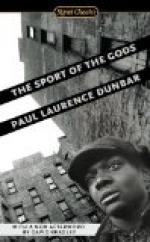In the black people of the town the strong influence of slavery was still operative, and with one accord they turned away from one of their own kind upon whom had been set the ban of the white people’s displeasure. If they had sympathy, they dared not show it. Their own interests, the safety of their own positions and firesides, demanded that they stand aloof from the criminal. Not then, not now, nor has it ever been true, although it has been claimed, that negroes either harbour or sympathise with the criminal of their kind. They did not dare to do it before the sixties. They do not dare to do it now. They have brought down as a heritage from the days of their bondage both fear and disloyalty. So Berry was unbefriended while the storm raged around him. The cell where they had placed him was kind to him, and he could not hear the envious and sneering comments that went on about him. This was kind, for the tongues of his enemies were not.
“Tell me, tell me,” said one, “you need n’t tell me dat a bird kin fly so high dat he don’ have to come down some time. An’ w’en he do light, honey, my Lawd, how he flop!”
“Mistah Rich Niggah,” said another. “He wanted to dress his wife an’ chillen lak white folks, did he? Well, he foun’ out, he foun’ out. By de time de jedge git thoo wid him he won’t be hol’in’ his haid so high.”
“Wy, dat gal o’ his’n,” broke in old Isaac Brown indignantly, “w’y, she would n’ speak to my gal, Minty, when she met huh on de street. I reckon she come down off’n huh high hoss now.”
The fact of the matter was that Minty Brown was no better than she should have been, and did not deserve to be spoken to. But none of this was taken into account either by the speaker or the hearers. The man was down, it was time to strike.
The women too joined their shrill voices to the general cry, and were loud in their abuse of the Hamiltons and in disparagement of their high-toned airs.
“I knowed it, I knowed it,” mumbled one old crone, rolling her bleared and jealous eyes with glee. “W’enevah you see niggahs gittin’ so high dat dey own folks ain’ good enough fu’ ’em, look out.”
“W’y, la, Aunt Chloe I knowed it too. Dem people got so owdacious proud dat dey would n’t walk up to de collection table no mo’ at chu’ch, but allus set an’ waited twell de basket was passed erroun’.”
“Hit ‘s de livin’ trufe, an’ I ‘s been seein’ it all ’long. I ain’t said nuffin’, but I knowed what ‘uz gwine to happen. Ol’ Chloe ain’t lived all dese yeahs fu’ nuffin’, an’ ef she got de gif’ o’ secon’ sight, ’t ain’t fu’ huh to say.”
The women suddenly became interested in this half assertion, and the old hag, seeing that she had made the desired impression, lapsed into silence.
The whites were not neglecting to review and comment on the case also. It had been long since so great a bit of wrong-doing in a negro had given them cause for speculation and recrimination.




